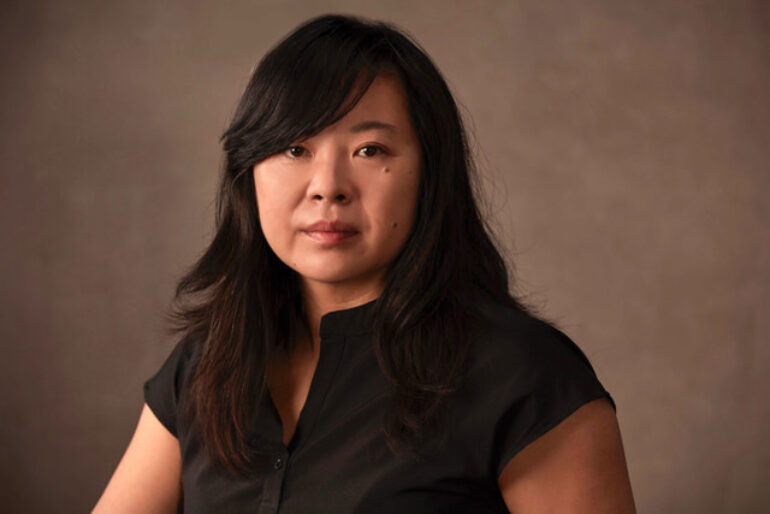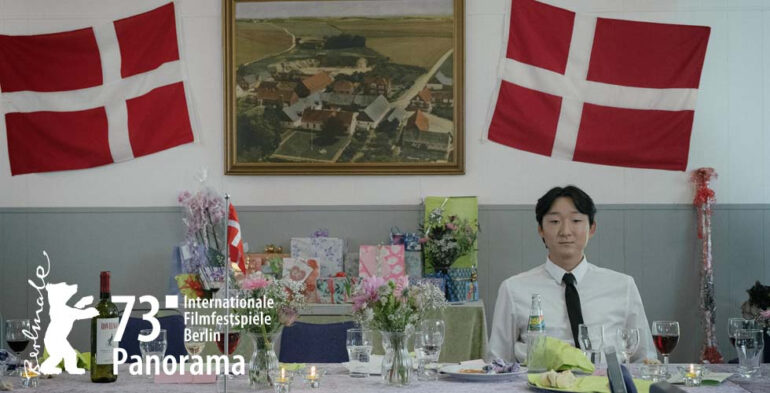Written by: Annika Pham
16.02.23
The fiction debut of the Danish director is having its world premiere at the Berlinale’s Panorama section Friday February 17. We spoke to the director ahead of the Berlinale.
The Quiet Migration is Choi’s first fiction film and second feature length in a trilogy about adoption, after her acclaimed hybrid The Return (2018).
Taking inspiration from her own experience of growing up in Denmark as a South Korean adoptee, Choi has directed a nuanced and poetic film about the young boy Carl (19), who lives a quiet life on a farm, with his adoptive parents. They expect him to take over the family farm, but Carl gradually feels the urge to search for his true identity and origin, a recognition that has consequences and will impact his adoptive parents’ plans.
In the title roles are Cornelius Won Riedel-Clausen as Carl in his first screen appearance, and Denmark’s high-profile actors Bodil Jørgensen and Bjarne Henriksen.
The film written by Malene Choi with Sissel Dalsgaard Thomsen, was produced by Maria Møller Kjeldgaard for Manna Film, with co-financing from DR, support from Danish Film Institute, Nordisk Film & TV Fond, and The West Danish Film Fund.
Øst for Paradis will release it in Denmark April 13, 2023. TrustNordisk handles sales.
Would you say that this film is a companion piece to The Return that tackles adoption from a different perspective?
Malene Choi: It is my second film in a trilogy about adoption. I’m trying to give a different perspective with each film and here it’s from the point of view of a young man, whereas The Return was from the perspective of a young woman called Karoline.
Why did you decide to set the film in a rural environment?
MC: For me the Danish countryside with cornfields, cows is so typical of Denmark and I wanted to focus on characters who are shaped by their environment. Here, Carl’s Asian origin clearly stands out. Plus I grew up in a similar environment. My grandparents owned a farm so I knew the types of conversations that people have in a farmhouse.
Carl seemed to be at a stage in his life where he just can’t stand anymore the banal racist micro-aggressions towards him, which is probably more prevalent in isolated communities. Is this very much what you wanted to highlight, although he does live in a loving adoptive family?
MC: Yes. His parents do consider him as their son, they speak Danish together, so they tend to forget about the boy’s different skin colour and origin. They are also from a generation where they feel: OK if we don’t talk about something, then it’s not a problem. But they can’t control what happens outside their home and Carl has to deal alone with his feeling of displacement and racism. Personally, I didn’t want to discuss this with my adoptive parents either, as I didn’t want to make them feel bad. So I just kept it for myself.
How old where you when you went to South Korea for the first time?
MC: I was 31. That was after film school. Before, I simply didn’t want to deal with it. I just wanted to be ‘normal’. Have an education, a normal life. I was putting aside hidden emotions and I was afraid I wouldn’t be able to control them. It was always something latent, bubbling inside.
The ‘quiet migration’ is a very interesting term as it’s common to discuss group migration but rarely do we talk about that aspect of individual migration - transnational adoption…
MC: Yes. We ourselves have been silent, but as grown-ups, we can tell how it is to be a hidden minority in Denmark. We do come with a more privileged status than other immigrants. But it’s also harder as we came alone at a very young age.
Do you feel there has been too much ‘quietness’ on the topic, that there needs to be more support to families and general awareness?
MC: Yes adoptive families have been left alone with all the problems that could emerge. Back in the days, the adoption agencies would screen the families, just to check on their financial conditions, but not so much if they were prepared psychologically to be multicultural families. Now it has changed a bit. Families do get support from psychologists, to try to understand the kind of life they can expect with adopted children. Korean adoptees in Denmark have also regrouped within the Danish Korean Rights Group. They have collected documents for instance about illegal adoptions, which is another difficult subject.
Carl’s parents are loving people, still they can’t prevent him from searching for his true origin. Was it important for you to show that inevitable phase, that is perhaps as painful for the adopted parents, and to make them likeable persons?
MC: Yes. In the beginning, I had written them as unsympathetic characters, but I felt it wasn’t real. I wanted to depict a realistic life in a farm, that the audience could perceive as a documentary. Also the actors themselves - Bodil and Bjärne asked if I could make their characters more likeable.
You have played also with the cinematic language to introduce supernatural elements - can you discuss the image of the meteorite, and Carl’s visions of Korea and the young Asiatic waitress Clara?
MC: I have had the feeling when I was young that I came from outer space and brought to Earth! I didn’t know where I came from, how life started for me, besides the fact that I came probably by plane. So the meteorite is a metaphor for alienation. With fiction, you can be more playful than with a documentary. Then for Carl, the vision of the young Asiatic girl Maria is like meeting the first Asian in his life.
The film is very much an observational and contemplative work, with little dialogue, and your camera which lingers on details, lets the viewer feel ‘from the inside’ Carl’s own emotions and sense of strangeness. Can you expand on your visual style and how you worked with your DoP and production design?
MC: We talked about creating a subtle film, with images where you could see the actor’s full bodies. For me the bodies have their own language. Also I like to give space for the audience to discover the film by themselves, and decide what to think by themselves.
Cornelius Clausen is a non-professional in the title role. Why did you choose an amateur for the main part and how did you work with him on character building?
MC: I wanted to have a non-professional young South Korean in the title role and my casting agent found Cornelius in a street in Copenhagen and ran after him! In the beginning, he was quite reluctant, but the way I worked with him was to put him in situations. Thanks to Bodil and Bjärne who were so professional, I knew I could control the scenes. They know the tempo to say the lines and as they are older, it was quite relaxed on set. I also used how they are naturally as persons.
Ultimately, what would you like audiences to take away from watching the film?
MC: I hope people will be more interested in transnational adoption and the unseen consequences that this quiet migration can create. Also, how does it feel to come from another place, as a fish out of water? What does it do to a person who hasn’t got access to his/her own story?
What’s next? Are you already working on the third instalment of your adoption trilogy?
MC: Yes. The working title is Killing of a boy, suicide of an adoptee and the grief of a mother. It’s about children who come to families who don’t like them and want to send them away or even have them killed. The main protagonist is a documentarian filmmaker from Denmark who is researching the cases. Some kids end up in South Korea or in the US. It’s based on true stories.
The film will also deal with the suicide of adoptees. We are the minority that commit most suicides in Denmark. Also, the biological mothers grieve about the loss of their kids that sometimes are given away without their consent. I try to tell the film in a subtle and poetic way, but that harsh side of transnational adoption will be the core of the story.
Then I have another idea for a reverse sci-fi, set in a not-too-distant future, where Asians take over Europe and Danes deliver babies for adoption to Asiatic families.
TO SEE THE TRAILER: CLICK HERE.

